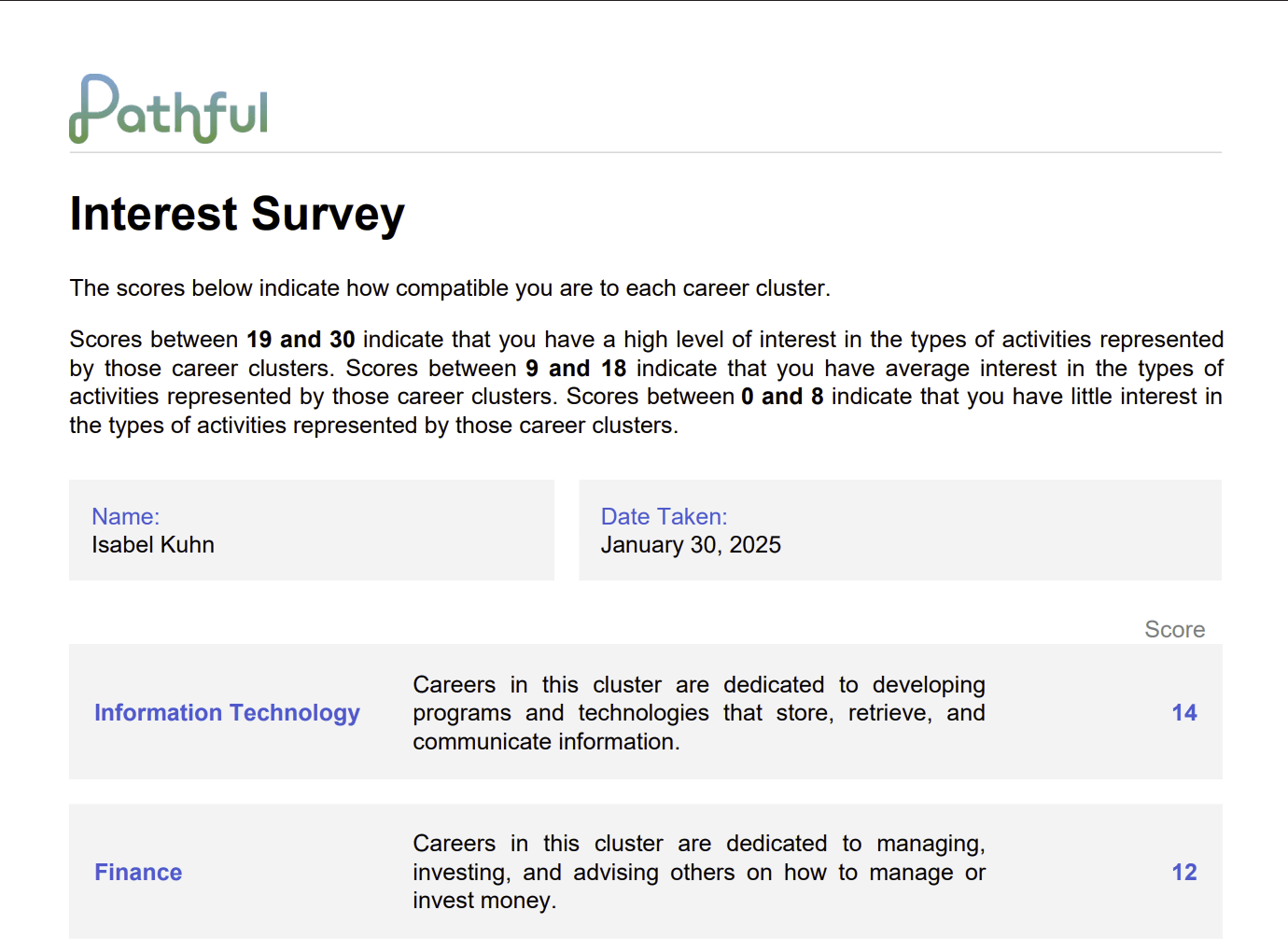Family-Teacher Collaboration: Using Pathful's Reports to Keep Families Engaged in Career Planning
Pathful's reports help educators share career insights with families, making them informed partners in students' career exploration.
.png)
We all know that families play a crucial role in helping students navigate their career paths - but let's face it, many families simply don't know how to support their child's career exploration effectively. They want to help, but the landscape of career options has changed dramatically since their own school days.
The challenge is compounded by limited school resources. According to the U.S. Department of Education NCES Report, the ratio of guidance counselors to students in public high schools is 1 to 284, and career planning ranks as counselors' fourth priority behind class scheduling, college preparation, and behavioral issues. Without family involvement, many students will postpone career exploration indefinitely.
Research shows that family influence and academic satisfaction are positively correlated with career decision self-efficacy and happiness, and four in five respondents indicate their families have influenced their career plans. However, this influence isn't always positive - a survey by Joblist.com found that while 48% of people felt their parents influenced their career path, 40% felt pressured to follow their parents' advice. When students end up in careers they feel no passion for, it can negatively affect their performance and mental health. This is why thoughtful, data-driven family involvement is so crucial.
That's where Pathful's reporting features come in, enabling educators to share valuable insights with families and helping them become active, informed participants in the career planning process.
How Pathful's Reports Keep Families Informed
Pathful's reports provide a comprehensive overview of each student's career interests, strengths, and completed career readiness activities. These insights aren't just valuable for educators - they're game-changers for family engagement. With these reports, educators can:
- Share personalized career assessment results with families, helping them understand their child's unique interests and aptitudes.
- Highlight completed and upcoming career exploration activities, giving families visibility into the career learning journey.
- Offer guidance on additional resources that families can explore at home to reinforce school-based career activities.
For instance, when an educator shares Pathful assessment results with families, they can point out that a student shows strong interest and aptitude in creative fields but hasn't explored related careers. This enables families to have more informed conversations about potential pathways like graphic design, marketing, or architecture that might not have been on their radar.

Ways Educators Can Use Reports to Engage Families
Pathful's data isn't just informative - it's actionable. Educators can leverage these insights to:
- Host data-driven career planning meetings that include families, using the reports as a concrete starting point for meaningful discussions and coming prepared with specific suggestions based on assessment results.
- Provide family-friendly career exploration activities based on assessment results, such as take-home resources that combine student data with actionable next steps, or suggestions for industry-specific museums, events, or professionals to connect with.
- Connect families with community resources by using assessment data to help identify relevant local experiences that align with their student's demonstrated interests and strengths.
- Encourage open conversations at home about career pathways and future goals, giving families conversation starters based on actual student interests rather than generic questions.
Middle school counselors can use Pathful reports during parent-teacher conferences to show families not just academic progress, but career exploration progress too. Parents often report that these insights help them support their children's interests in more targeted ways, from finding relevant summer programs to connecting them with family friends in fields of interest.
Addressing Common Challenges
Many families feel unprepared to guide career exploration or worry about influencing their children incorrectly. Pathful reports address both concerns by providing objective data and clear direction. When families see their child's interests and strengths reflected in professional assessments, they gain confidence in supporting specific pathways.
Additionally, reports help families understand that career exploration is about finding what works for their child, not making permanent decisions. Students are gathering valuable information about their preferences and abilities rather than committing to rigid career paths.
Helping Families Support Career Readiness at Home
With the rich insights from Pathful's reports, families can become active partners in career development:
- Guiding students toward extracurricular activities that align with their career interests - whether it's robotics club for the budding engineer or debate team for the future lawyer.
- Encouraging participation in career fairs, job shadowing, and mentorship programs that match their specific interests rather than generic "good experiences."
- Helping students set realistic goals for postsecondary education and training based on actual career aspirations rather than assumptions.
Schools that share Pathful reports with families often see increased student participation in career-aligned community activities. This happens because families gain better understanding of which experiences would be most valuable for their child's specific interests and goals.
Getting Started: Your (Example) Action Plan
Week 1: Review your current family communication practices around career planning. Examine three student reports and identify specific talking points for family conferences.
Week 2: Contact five families to schedule career-focused meetings. Use Pathful reports to prepare targeted recommendations for each student. Research local professionals, programs, or experiences that align with their assessment results.
Week 3: Begin implementing take-home career resources. Create template packets that combine assessment data with actionable next steps families can pursue immediately.
Month 2: Establish ongoing communication systems. Set up quarterly career check-ins with families and create methods for sharing updates about students' exploration activities and developing interests.
The Collaborative Impact
When families are involved in their children's schooling, students show higher academic achievement, school engagement, and motivation, (according to a 2019 American Psychological Association review of 448 independent studies on family involvement). Pathful's reporting features don't just inform - they empower families to take an active, meaningful role in their child's career planning journey.
By fostering collaboration between educators and families, students receive consistent support and encouragement from all directions, making them more likely to explore, engage, and make informed decisions about their future. When we bring families into the career readiness conversation with concrete data and clear guidance, we create a powerful support network that helps students thrive in their career exploration.

.webp)





.png)